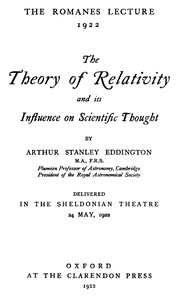The theory of relativity and its influence on scientific thought by Eddington
"The theory of relativity and its influence on scientific thought" by Eddington is a scientific publication delivered as the Romanes Lecture in 1922. The book discusses the revolutionary implications of Einstein's theories of relativity on our understanding of space and time, marking a significant shift in scientific thought from a geocentric to a more abstract and relativistic perspective. In this lecture, Eddington explains how Einstein's theories challenge long-held notions of fixed frames
of reference, asserting that the measurements of space and time are relative to the observer’s motion. He elaborates on concepts such as the FitzGerald contraction and how they arise from the need to view physical phenomena without the distortions imposed by our earthly point of view. By illustrating the relativity of physical laws and the geometry of the universe, Eddington emphasizes the profound impact of Einstein's work on fields like mechanics and gravitation, arguing that a new understanding of the four dimensions of space-time reshapes not only physics but also our broader comprehension of existence in the cosmos. (This is an automatically generated summary.)
Read or download for free
| How to read | Url | Size | |||
|---|---|---|---|---|---|
| Read now! | https://www.gutenberg.org/ebooks/70272.html.images | 85 kB | |||
| EPUB3 (E-readers incl. Send-to-Kindle) | https://www.gutenberg.org/ebooks/70272.epub3.images | 217 kB | |||
| EPUB (older E-readers) | https://www.gutenberg.org/ebooks/70272.epub.images | 217 kB | |||
| EPUB (no images, older E-readers) | https://www.gutenberg.org/ebooks/70272.epub.noimages | 111 kB | |||
| Kindle | https://www.gutenberg.org/ebooks/70272.kf8.images | 252 kB | |||
| older Kindles | https://www.gutenberg.org/ebooks/70272.kindle.images | 243 kB | |||
| Plain Text UTF-8 | https://www.gutenberg.org/ebooks/70272.txt.utf-8 | 77 kB | |||
| Download HTML (zip) | https://www.gutenberg.org/cache/epub/70272/pg70272-h.zip | 195 kB | |||
| There may be more files related to this item. | |||||
Similar Books
About this eBook
| Author | Eddington, Arthur Stanley, Sir, 1882-1944 |
|---|---|
| LoC No. | 23002581 |
| Title | The theory of relativity and its influence on scientific thought |
| Original Publication | United Kingdom: The Clarendon Press, 1922. |
| Series Title | The Romanes lecture, 1922 |
| Credits | Laura Natal Rodrigues (Images generously made available by Hathi Trust Digital Library.) |
| Reading Level | Reading ease score: 52.3 (10th to 12th grade). Somewhat difficult to read. |
| Language | English |
| LoC Class | QC: Science: Physics |
| Subject | Relativity (Physics) |
| Subject | Science -- Philosophy |
| Category | Text |
| EBook-No. | 70272 |
| Release Date | Mar 12, 2023 |
| Copyright Status | Public domain in the USA. |
| Downloads | 209 downloads in the last 30 days. |
| Project Gutenberg eBooks are always free! | |

